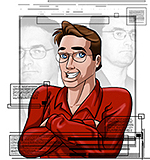I had fun writing about The Big Score mentality in America, how the idea of seeking One Big Score distorts culture and economics. I got some response on it, and have been thinking about it a bit more.
The idea of a Big Score also distorts leadership, a subject I find myself mulling over constantly as I look at the state of the economy and government (though mostly I’m thinking business/economic leadership here). There’s talk of leadership this and leadership that. Thought leaders. Technical leaders. You can’t follow the leader since we have so bloody many of them.
The Big Score seriously distorts leadership. Looking for the Big Jackpot Win in fact isn’t leadership.
Think about leadership focused on the Big Score. It’s not about sustainability. It’s not about maintaining a company or organization. It’s focused on getting everything to the Big Score.
Thus in a weird way it’s anti-leadership.
There’s no comprehensive vision beyond The Big Score.
There’s no sense of a big, sustainable picture because there’s no thinking beyond The Big Score.
There’s no sense of the price paid for The Big Score.
There’s so much reliance on the Big Score there’s little thought on what happens next.
There’s no courage. The Big Score predominates all, and few want to argue with it or challenge it.
I’m lucky to have worked under and with a lot of people who do lead and don’t live The Big Score. In fact, they probably contribute more to any Big Scores that do happen than anyone else.
As I look at the lottery-ticket mentality of many businesses and organizations, in finance and in technology, I think we’ve got too much Big Score leadership. It’s not guiding us to the future, it’s guiding us to a hopeful economic Rapture, and too often many people just fall back to earth.
Steven Savage is a Geek 2.0 writer, speaker, blogger, and job coach. He blogs on careers at http://www.fantopro.com/, nerd and geek culture at http://www.nerdcaliber.com/, and does a site of creative tools at http://www.seventhsanctum.com/. He can be reached at https://www.stevensavage.com/.

